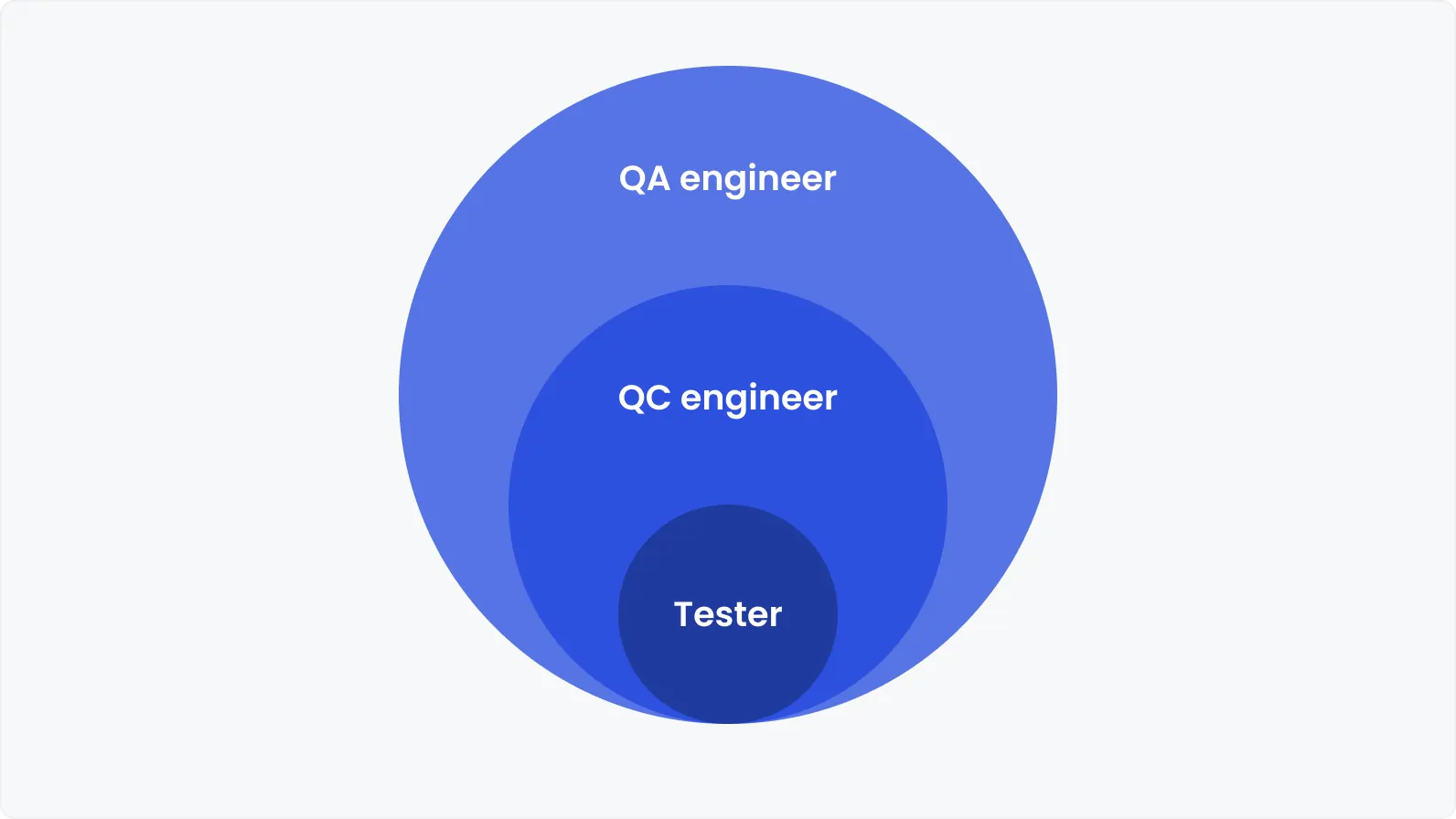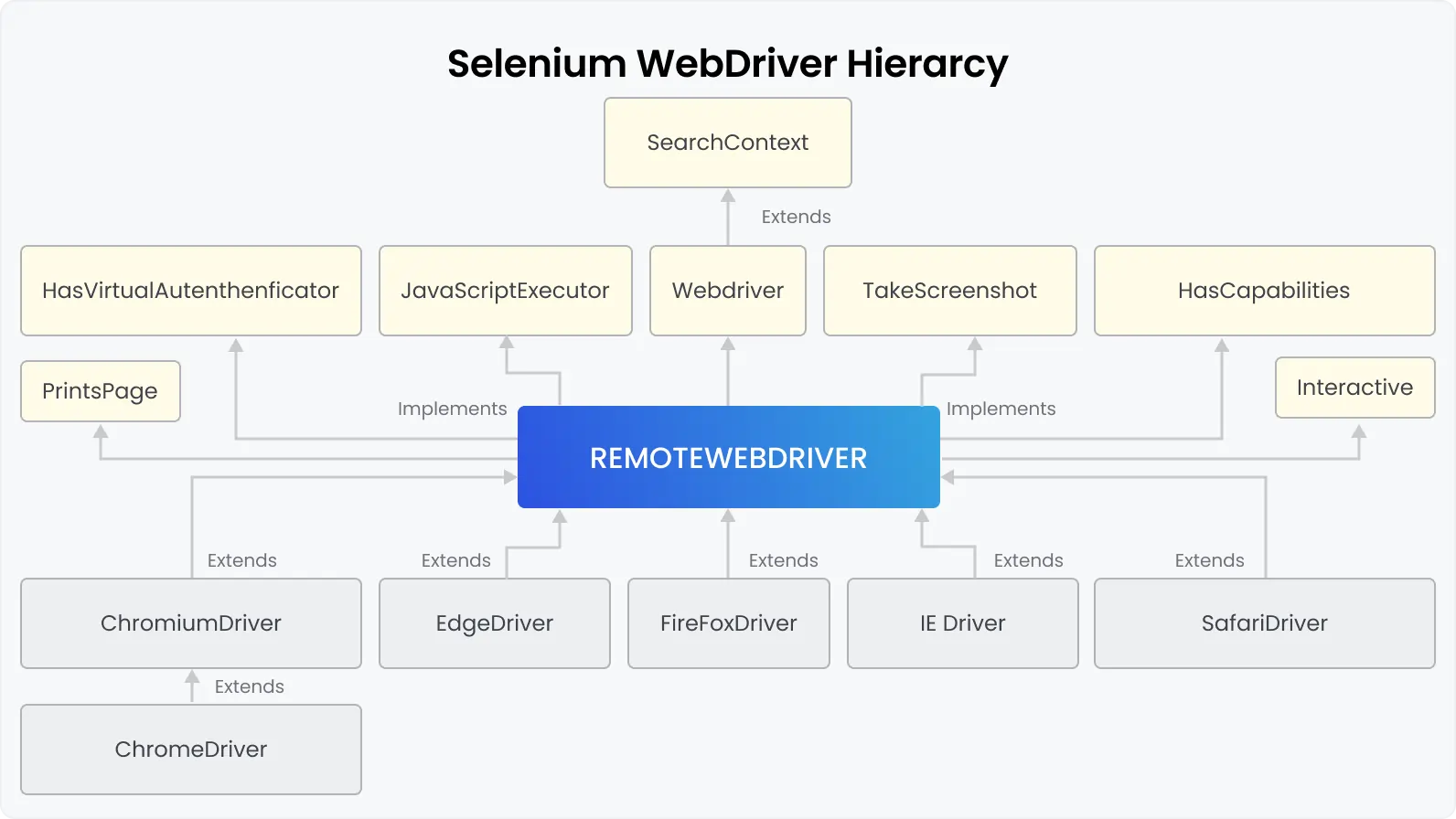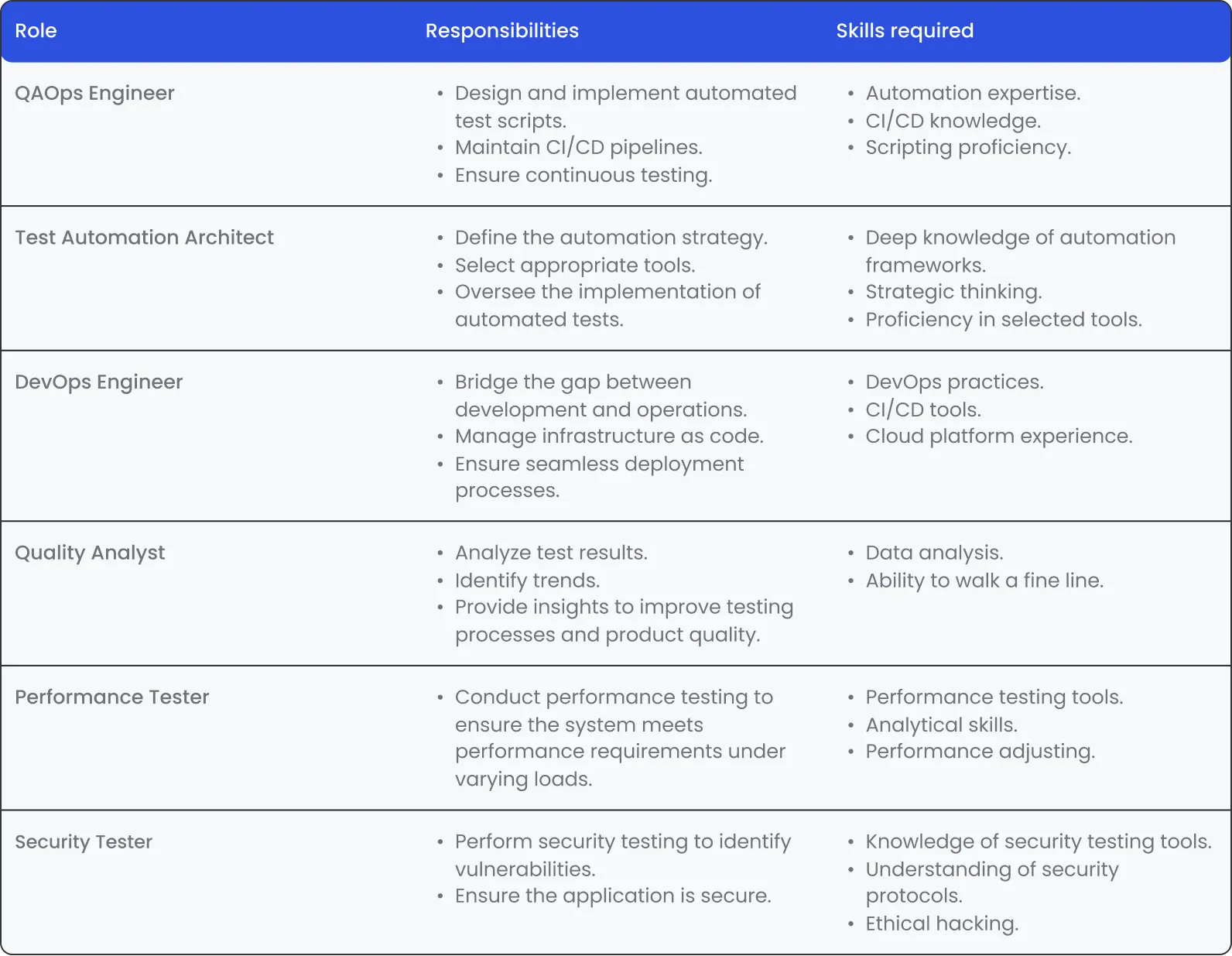9 minutes to read
Building a QAOps team: Skills and roles you need


Mykhailo Ralduhin
Senior QA Engineer
DevOps practices, security upgrades, Artificial Intelligence, and Machine Learning — the tech world never sleeps. The most interesting paradox is that the further technology goes, the worse the quality gets. For example, according to IBM, the global average cost of data breach in 2024 already hit USD 4.88 million, which is 10% higher compared to the previous year.
This is where a specialized continuous testing team came into play. If you want to enhance the quality of your software product, you should ensure tests run continuously and at each stage of the software development lifecycle. This way, you can rest assured that your app or web platform is under control. And this achievement is impossible without a dedicated QA team.
Listen to H.E. Luccock’s words, “No one can whistle a symphony; it takes a whole orchestra to play it.” Couldn’t agree more. Effective teamwork is not a luxury — it's a necessity for meeting today’s demanding standards.
QAOps, the integration of Quality Assurance into DevOps practices, has become indispensable for businesses aiming to deliver high-quality software quickly. Tools and automation are a good choice, yet the key lies in building a specialized QAOps team capable of managing the complexities of continuous testing and delivery.
Fast releases with confidence. Powered by QAOps
Overview of QAOps
In a nutshell: What’s QAOps
DevOps and QA integration increases the efficiency of the continuous integration and delivery (CI/CD) pipeline. Traditional QA poses testing in a separate phase, while QAOps ensures that testing is continuous, automated, and closely tied to the development process. The primary goal of quality assurance operations is to detect and address defects early. Additionally, the company gets high-quality standards throughout the software development lifecycle and rapid market entry.
QAOps methodology makes it possible to identify and resolve issues fast, preventing costly fixes later in the cycle.
Dedicated team enhances focus
DevOps and QA integration are much more than tools and automation. We’d call them philosophy as they demand a complex approach and a dedicated team with the right focus. Continuous testing team is crucial because it ensures that quality assurance is seamlessly integrated into every aspect of the CI/CD pipeline. Without such a team, the benefits of QAOps (faster releases, higher software quality, etc.) are harder to achieve.

Tricentis revealed that top US companies lose USD 300,000 per hour on average during downtimes. A dedicated QAOps team, in turn, ensures that testing is continuous and brings expertise in integrating new tools, managing test environments, and refining processes as the project scales.
Key skills required for a QAOps team
Technical skills
Automation tools and frameworks: Familiarity with automation toolset. JMeter, Selenium, Appium, and TestComplete are a must-have. As a leader, you should ensure two dimensions of proficiency: over-ABCs on how to use these tools and the integration dimension — tools must seamlessly integrate into the CI/CD pipeline.

Scripting and programming languages: Automation scripts are the ABCs of continuous testing in QAOps. Basics and a particular proficiency level in Python, Java, or JavaScript are essential for writing effective test scripts. Additionally, scripting skills are necessary for creating custom automation solutions tailored to specific project needs.
Cloud platforms and infrastructure: The shift toward cloud is gaining ground, and more companies are moving their development and testing environments to AWS, Azure, or Google Cloud. All QAOps team roles should understand dependencies within cloud technology.
For example, AWS provides tools like EC2 for creating virtual test environments that can be scaled up or down based on demand. So, mastery of such tools should also be included in QAOps skills.
Security skills
Security testing methodologies: Penetration testing, vulnerability scanning, and security code reviews change the security landscape, and your QA team must be well-versed in these methodologies. A QAOps engineer who can effectively conduct penetration tests using tools like OWASP ZAP can identify and mitigate security vulnerabilities before they are exploited, so your software product will be protected from potential breaches.
DevSecOps practices: The development process is a complex thing, and it is becoming even more sophisticated. So, lines between different roles and departments (development, operations, security, etc.) blur. QAOps professionals need to understand how to embed security checks into the CI/CD pipeline to make sure security is not an afterthought but an integral part of the development process.
Compliance and regulatory standards: With the growing emphasis on data privacy and security, QAOps teams must be familiar with relevant compliance and regulatory standards such as GDPR, HIPAA, or PCI-DSS. This knowledge ensures that the software adheres to industry regulations and avoids costly compliance violations.
For example, ensuring that personal data is handled in accordance with GDPR requirements during testing and development is crucial for avoiding legal penalties and maintaining customer trust. QAOps engineers should be capable of implementing and testing these compliance requirements as part of their regular processes.
Analytical skills
Problem-solving abilities: Effective QAOps team addresses issues in real-time and saves the pace of development. These skills enable team members to diagnose problems quickly and implement solutions without causing significant delays. By the way, McKinsey included problem-solving in their key skills list for potential candidates years ago. And guess how much they increased true talents in their company?
Data analysis skills: QAOps generates a large amount of data, from test results to performance metrics. Being able to analyze this data effectively is crucial for making informed decisions. Appropriate analysis of test coverage reports identifies areas of the codebase that are under-tested and at higher risk of defects.
When interviewing QA specialists, assess their knowledge of Grafana or Kibana (tools for visualization metrics and trends). This way, it’ll be easier for you to understand the depth of QA pro knowledge.
Soft skills
Communication skills: QAOps is based on cross-team work. For this reason, strong communication skills are vital for project success. 86% of top executives lack effective communication. On the other hand, McKinsey states that well-connected teams can boast a 20-25% increase in productivity.
Ability to work in a fast-paced, agile environment: The nature of QAOps demands agility. Team members must be comfortable with rapid iteration and quick decision-making. In an agile environment, priorities can shift quickly, and the QAOps team needs to adapt without losing focus on quality.
Continuous learning mindset: This point applies to any team, it’s not limited to QAOps. Yet, here it has a separate place. Whether it’s mastering new automation tools, learning a new programming language, or staying updated on the latest QA trends, the ability to learn and adapt quickly is crucial.
Essential roles in a QAOps team

Building and nurturing the QAOps team
Hiring the right talent: Strategies for success
Leverage specialized recruitment agencies: Sometimes it makes sense to narrow your choice down. Look for HR agencies that focus specifically on QA and DevOps roles. They have networks of pre-vetted candidates, can free your time, and reduce the attention and effort involved in finding the right talent. However, double-check if the agency understands the unique needs of a QAOps team, such as expertise in CI/CD tools and automation frameworks.
Use deep search on industry-specific platforms: LinkedIn, GitHub, and Stack Overflow are well-known sources of talent. Apart from detailed job descriptions with all the information needed, try advanced search methods. AI tools, for example. A tip: try to fit your culture code in the job description. This way, you’ll weed out irrelevant candidates. At least, you’ll make a move toward it.
Offer growth, real growth: Make sure you cast aside all generic phrases from the vacancy. “You have an opportunity to join a high-skilled team and learn from top talent”. It’s good yet not convincing. Top QAOps talent is often attracted to roles where they can expand their skills and work on innovative projects. Details the project and unique expertise of your people. Name those people, list the tools they will be using, and describe the mission of the project in practical terms. Specific information will always beat the form, even if it is written a bit boring.
Emphasize the importance of culture: Seasoned entrepreneurs say they'd prefer a professional with extraordinarily developed soft skills over a candidate who’s only tech-skilled. And it makes sense as hard skills are easier to obtain. Zappos offered new hires USD 2,000 to leave if they feel they don’t align with the company culture.
Team collaboration and communication
Advocate transparency: Leaders should create an environment where team members feel safe to express their ideas, concerns, and challenges. When transparency is a core value, teams are more likely to collaborate effectively and innovate.
Implement the right collaboration tools: Slack, Jira, Confluence, Microsoft products — choose to your liking. But make sure collaboration tools fit your goals and resources. Ensure that all team members are trained to use these tools effectively, and establish guidelines for their use to avoid information overload or miscommunication.
Hold focused meetings: You may be surprised that poor communication costs the US economy USD 1.2 trillion annually. Your meetings should be brief and to the point, focusing on progress, roadblocks, and upcoming tasks. A little trick: place the cost of 1 hour for each participant into the description of the meeting. An excellent attention booster.
Encourage continuous feedback and improvement: Retrospectives or feedback sessions can help the team identify what’s working and what needs improvement. However, you should walk a fine line as there is a very big risk of building a hidden toxic atmosphere.
To sum up
Building a QAOps team can place you in hot water. On the one hand, technical skills like automation expertise, CI/CD knowledge, and proficiency in scripting are crucial for driving efficiency. On the other, soft skills like analytical thinking, problem-solving, and communication prowess, can offset the lack of hard skills.
An effective QAOps team can significantly enhance your software development process. Namely:
Improve software quality and reduce defects.
Accelerate time-to-market through efficient testing and automation.
Enhance collaboration and communication among teams.
Optimize resource allocation and reduce costs.
If you’re looking to build a new QAOps team or implement QAOps best practices into existing one, DeviQA is here to help. Contact us today to learn more about how our QA and testing services can support your business goals and drive success.
Team up with an award-winning software QA and testing company
Trusted by 300+ clients worldwide



